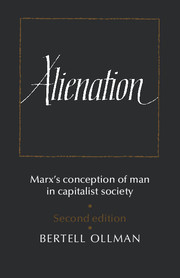Book contents
- Frontmatter
- Contents
- Preface to the second edition
- Note on translations
- Acknowledgements
- General introduction
- PART I PHILOSOPHICAL INTRODUCTION
- PART II MARX'S CONCEPTION OF HUMAN NATURE
- PART III THE THEORY OF ALIENATION
- 18 The theory of alienation
- 19 Man's relation to his productive activity
- 20 Man's relation to his product
- 21 Man's relation to his fellow men
- 22 Man's relation to his species
- 23 The capitalist's alienation
- 24 The division of labor and private property
- 25 The labor theory of value: labor-power
- 26 Value as alienated labor
- 27 The metamorphosis of value
- 28 The fetishism of commodities
- 29 Class as a value Relation
- 30 State as a value Relation
- 31 Religion as a value Relation
- 32 Marx's critique of bourgeois ideology
- PART IV CONCLUSION
- Appendix I In defense of the philosophy of internal relations
- Appendix II Response to my critics: more on internal relations
- Notes to the text
- Bibliography of works cited
- Index of names and ideas
- Cambridge Studies in the History and Theory of Politics
24 - The division of labor and private property
Published online by Cambridge University Press: 05 June 2012
- Frontmatter
- Contents
- Preface to the second edition
- Note on translations
- Acknowledgements
- General introduction
- PART I PHILOSOPHICAL INTRODUCTION
- PART II MARX'S CONCEPTION OF HUMAN NATURE
- PART III THE THEORY OF ALIENATION
- 18 The theory of alienation
- 19 Man's relation to his productive activity
- 20 Man's relation to his product
- 21 Man's relation to his fellow men
- 22 Man's relation to his species
- 23 The capitalist's alienation
- 24 The division of labor and private property
- 25 The labor theory of value: labor-power
- 26 Value as alienated labor
- 27 The metamorphosis of value
- 28 The fetishism of commodities
- 29 Class as a value Relation
- 30 State as a value Relation
- 31 Religion as a value Relation
- 32 Marx's critique of bourgeois ideology
- PART IV CONCLUSION
- Appendix I In defense of the philosophy of internal relations
- Appendix II Response to my critics: more on internal relations
- Notes to the text
- Bibliography of works cited
- Index of names and ideas
- Cambridge Studies in the History and Theory of Politics
Summary
From the worker's fourfold alienation in the means of production our investigation branches off in two directions. The first takes us further into economics proper, to the division of labor, private property and, eventually, to Marx's treatment of the economic components of the capitalist system in Capital. The second takes us to other areas of man's life, social intercourse, politics and religion being the most important of these.
Our journey of inquiry will begin with Marx's economics, but, in the present chapter, evidence from Capital will not be used. The Economic and Philosophic Manuscripts of 1844 and other of Marx's early writings contain a great deal of economics which has been clearly fashioned as part of the broader theory of alienation. Capital exhibits the same connections, but they are not made explicit as often as they are in these early works. My aim in this chapter is to lay bare the ties between man's alienation, as described thus far, and the whole sphere of economics. Afterwards, when I come to Marx's chief contribution to economic thought, the labor theory of value, my main source will be Capital.
Engels declares ‘economics deals not with things but with relations between persons, and, in the last resort, between classes; these relations are, however, always attached to things and appear as things’. On this definition, it is man's alienated relations to his activity, products and other men, as expressed in the overt relations between things, that is the subject matter of Marx's economics.
- Type
- Chapter
- Information
- AlienationMarx's Conception of Man in a Capitalist Society, pp. 157 - 165Publisher: Cambridge University PressPrint publication year: 1977

